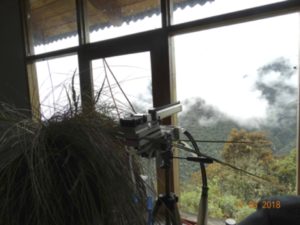I came back to Sao Paulo, Brazil, as soon as the course finished and I had forgotten how chaotic is my city. It took me some time to be ready to back to my PhD project. Now I am focused in my leaves and their venation looking forward to processing 11 plots!
When I applied to the course I wanted to improve my skills in plant functional trait science, to ensure I am doing my PhD project with a quality that I can compare to the work of more experienced researchers. Also, as I am studying leaf venation, I choose the project of plants thermoregulation and photosynthesis, because I thought that it would help to understand the mechanistic basis of leaf photosynthesis, cooling and the possible influence of leaf veins in these processes.
I had reached my goals, in fact the course was over my expectations. I realized that, although some misspelling and confusions, I can communicate well in English and not so well in Spanish. I could see that I was on the right way to produce good quality plant functional trait works and data and I confirmed that studying computer codes is a must to perform a good work. Moreover I increased my professional network, did friends and had the opportunity to know different cultures.
In the Climate Change research I learned that people from Cuzco and Paucartambo understand partially what is the climate change and its consequences. They mostly accept that planet is warming and that it is largely due to human activities. Nevertheless they do not understand well why or how it is happening. I believe in my country we would have similar results, since we have similar historical and sociological aspects when compared with Peru.
Thanks to Paul, the interviews were possible, because I don’t feel confident enough to talk to Spanish-speakers in Spanish or in “Portunhol” (Portuguese with Spanish). I feel that the information obtained is valuable to think about the gap between the science and the common sense and that we need to know how to explain what we study to people that we aim to help with our research so they can be more acknowledged and support us. Despite the research was well succeeded, I felt that I could not really understand why we observed such results. We speculate, but I believe the Peruvian students could explain it better and I would like to have had their feed-back. So my suggestion is that we talk more with Peruvian students about their country and their hypothesis about the results.
To sum up I learned a lot, I loved to interact with everyone in the course, all the people were nice and smart and I feel very happy that I had the opportunity to participate of this course. I would like to thank every person involved.


